New Delhi: Three women in their 60s sweat through a power cut in a South Delhi flat, rehearsing lines for a play about the iconic mothers of Indian cinema. They want to strip matriarchs like Nirupa Roy, Durga Khote and Leela Chitnis of the melodrama and martyrdom, and bring out their humanity.
The upcoming Mere Paas Maa Hai is the latest convention-defying production by Three Arts Club, a women-led collective that has been pushing the boundaries of Delhi theatre for decades, undeterred by tight budgets or flashy trends.
“We’re a little more flexible. Experimental. That’s why people are responding. Sometimes it’s two art forms, sometimes three, all in one production. That’s how we’ve built a loyal audience,” said theatre actor and director Sohaila Kapur at her second-floor home in New Friends Colony, which has seen years of late-night run-throughs, missed dinners, and impromptu rewrites.
Founded in 1943 in Shimla, Three Arts Club was one of the first theatre groups in pre-Independence India to put women on stage. Now, helmed by Sohaila Kapur, Anuradha Dar, and Anuradha Kapur, it’s still going against the grain.
In a theatre world beleaguered by funding constraints and formulaic storytelling, it has survived by doing things differently. They don’t have a permanent venue, big-name actors, or even tickets for most shows. What they do have is a steady run of productions that resist the usual mould. Over the years, the group of about 15 regulars and rotating performers has put up stage documentaries, performances in gardens and living rooms, and even pieces that use scent, live painting, or unscripted conversation.
We’ve been told by other theatre groups that we’re spoiling the market for doing unpaid shows. They think we’re mad
-Sohaila Kapur
Each format reimagines how stories can be experienced. Lives Lived, their conversation series, focuses on the creative and professional accomplishments of people who are typically in their 60s to 80s. Anand Hi Anand, based on Sohaila Kapur’s maternal uncles, Chetan, Vijay, and Dev Anand, uses family stories, film clips and letters to bring alive their creative partnership. Love Letters, staged earlier this month at Akshara Theatre, has Sohaila Kapur and Sunit Tandon doing a dramatic reading that tells a saga about unfulfilled romance and regret without any action or interaction. The group didn’t stop even during the Covid-19 lockdown, when they staged Ra(a)nn and Sonata entirely on Zoom. These were later edited into digital stage pieces.
Revived after a hiatus of 25 years in 2008, the tagline on the website of Three Arts Club goes: “The past is our foundation; the present is our stage.”
“The legends of Indian theatre were once part of Three Arts Club,” said theatre actor and director MK Raina, who has been working with them for over a decade. “They have maintained consistent, year-round productions, where many others fade after a single show. They approach theatre like a laboratory, adapting stories and poems into layered, experimental performances.”
In Delhi’s theatre scene, doing English plays as women over 50 is practically an act of rebellion. “Three things—being a female, being older, and also doing English plays. No one tolerates that,” said Sohaila Kapur wryly.
Also Read: A Muslim woman is telling Ramayana, Mahabharata stories in Urdu. ‘Stories belong to all’
Breaking boundaries—and the fourth wall
The two friends fought, fell in love, drifted apart, married others, but they never stopped writing to each other. In AR Gurney’s play Love Letters, they read aloud the longing letters they exchanged over five decades, but they rarely meet. A dramatised reading with no conventional action, it’s the kind of play rarely seen on a Delhi stage.
Akshara Theatre’s latest staging had its own bittersweet layer. Sohaila Kapur and Sunit Tandon reprised the roles three decades after first enacting them, in a final performance before the theatre closes for renovation. In this version of Love Letters, produced in collaboration with Katyayani Theatre Production, the two actors move effortlessly through ages and emotions. Their expressions shift as time does, marked by fading lights, silences, and the quiet ache of anticipation.
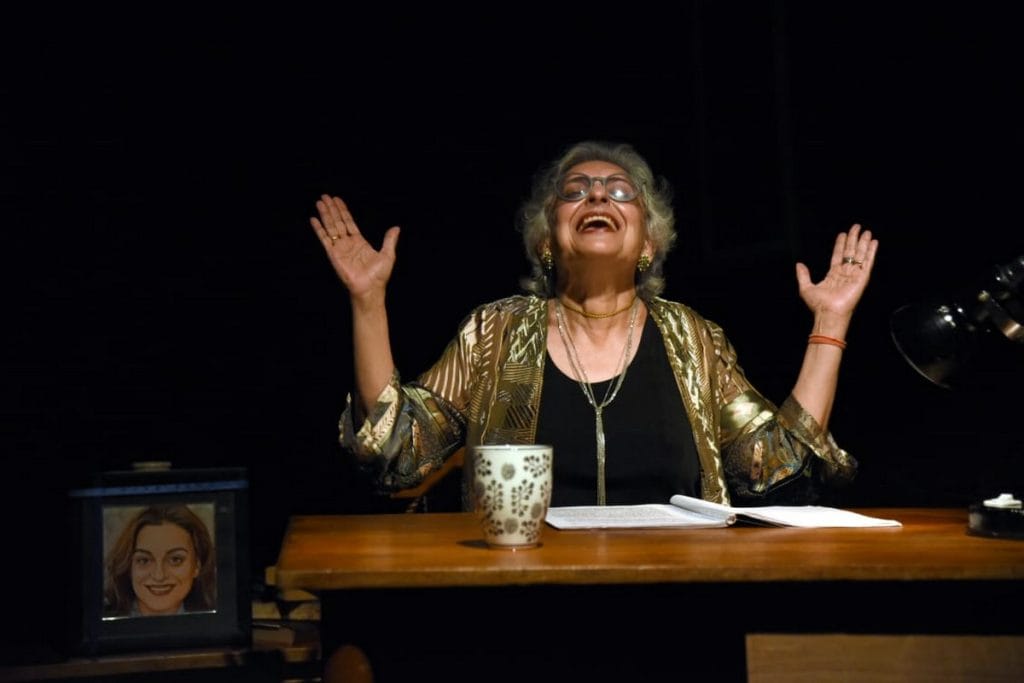
Playing with genre and improvising is what the group does best. In what they call Walking Art, performers move around the audience, speak directly to viewers, and sometimes even sit among them. One show had a live painter on stage. Another, Ghost Story, experimented with smell: as the apparition appeared, the room filled with the scent of rosewater. The boundary between actor and spectator often dissolves.
That spirit of reimagining continued this year with the staging of Park by Manav Kaul at Triveni. Director Kapur reversed the layout—the audience sat on the stage, while the play unfolded in the gardens, with the Triveni building itself becoming part of the set.
Theatre should be for everyone, not just for those who can afford it. Our audiences respond to that honesty. They feel seen. They feel part of something meaningful, and word spreads
-Anuradha Dar
“The light technician fought back, but the team persisted,” said Kapur.
In one memorable scene, the female protagonist dried her hair on a balcony as her Romeo watched from below, with the audience bursting into laughter. The unconventional staging was such a success that it was later recreated in Shimla’s Gaiety Theatre.
Kapur’s first Broadway-licensed production under her Katyayani theatre group was Cloud Tectonics by José Rivera, the Oscar-nominated writer of the 2004 film The Motorcycle Diaries. The play was staged at Akshara Theatre.
“In one scene, the husband and wife return home. We opened the back door on stage and created a full rainstorm—thunder, lightning, even a shower. It was so real, people forgot it was theatre,” said Kapur.
The group takes a fluid approach to both content and form. MK Raina’s Kafan-Kafan Chor merges Munshi Premchand’s Kafan with Kashmiri writer Amin Kamil’s Kafan Chor to explore contemporary realities of violence and conflict. Rather than just dialogue, the production used imagery, poetry, and movement to propel the story.
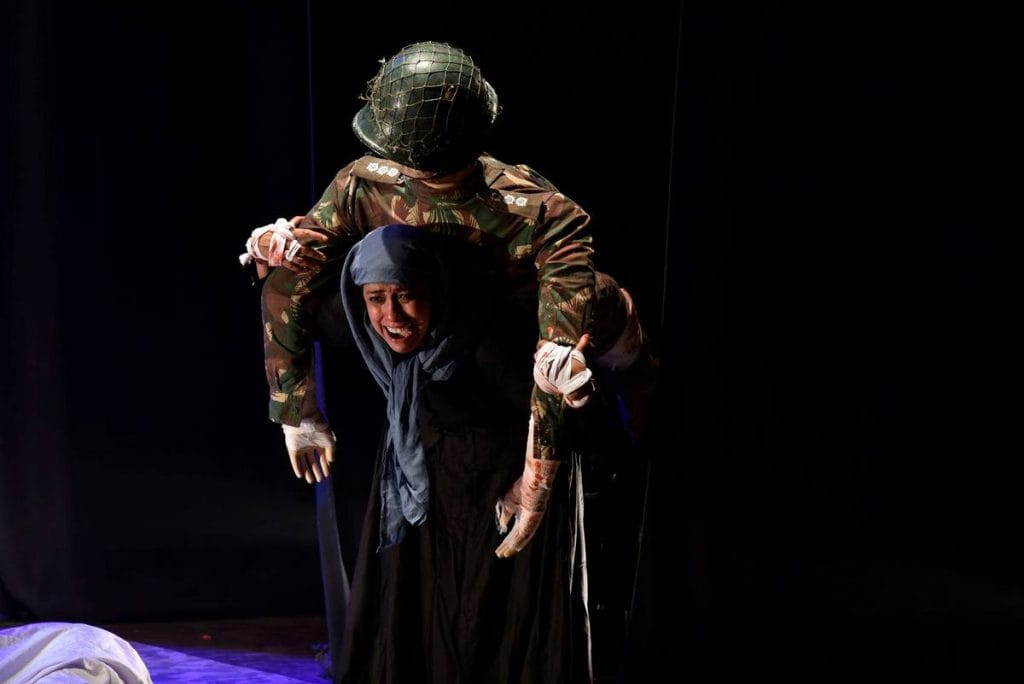
While Three Arts Club doesn’t actively chase the festival circuit, they’ve not been absent from it. In fact, their work has consistently earned recognition and repeated invitations to some of the country’s most prestigious theatre platforms.
Kafan-Kafan Chor, directed by Raina, was performed at the 8th Theatre Olympics in 2018 and later at the Kartik Hazarika National Theatre Festival in Tezpur in 2019. Their production Baki Itihaas was showcased at the 18th Bharat Rang Mahotsav in 2016, and it was twice honoured by the Sahitya Kala Parishad as one of the best plays of the year. Hatya Ek Aakar Ki was selected as a standout production at the Bhartendu Natya Utsav in 2018, performed at Kamani Auditorium.
“That’s what good theatre does–it educates, entertains, and raises questions. Bedroom comedy is over. Today, theatre critiques history and contemporary times. It searches,” said Raina.
But the group’s ethos and way of working has its detractors.
The few grants they receive, such as the Ministry of Culture’s repertory support, go directly to artists and not to production costs.
Theatre against the odds
At a time when most theatre groups are struggling to survive—whether leaning on corporate sponsorships, scrambling for festival slots, or shutting down altogether—Three Arts Club continues to stage regular, well-attended, and often free productions in Delhi.
Behind the scenes, though, the group has to contend with myriad challenges. They often work without budgets or venues, sometimes even dipping into personal savings to keep shows going. The few grants they receive, such as the Ministry of Culture’s repertory support, go directly to artists and not to production costs.
“We’ve been told by other theatre groups that we’re spoiling the market for doing unpaid shows. They think we’re mad,” said Kapur.
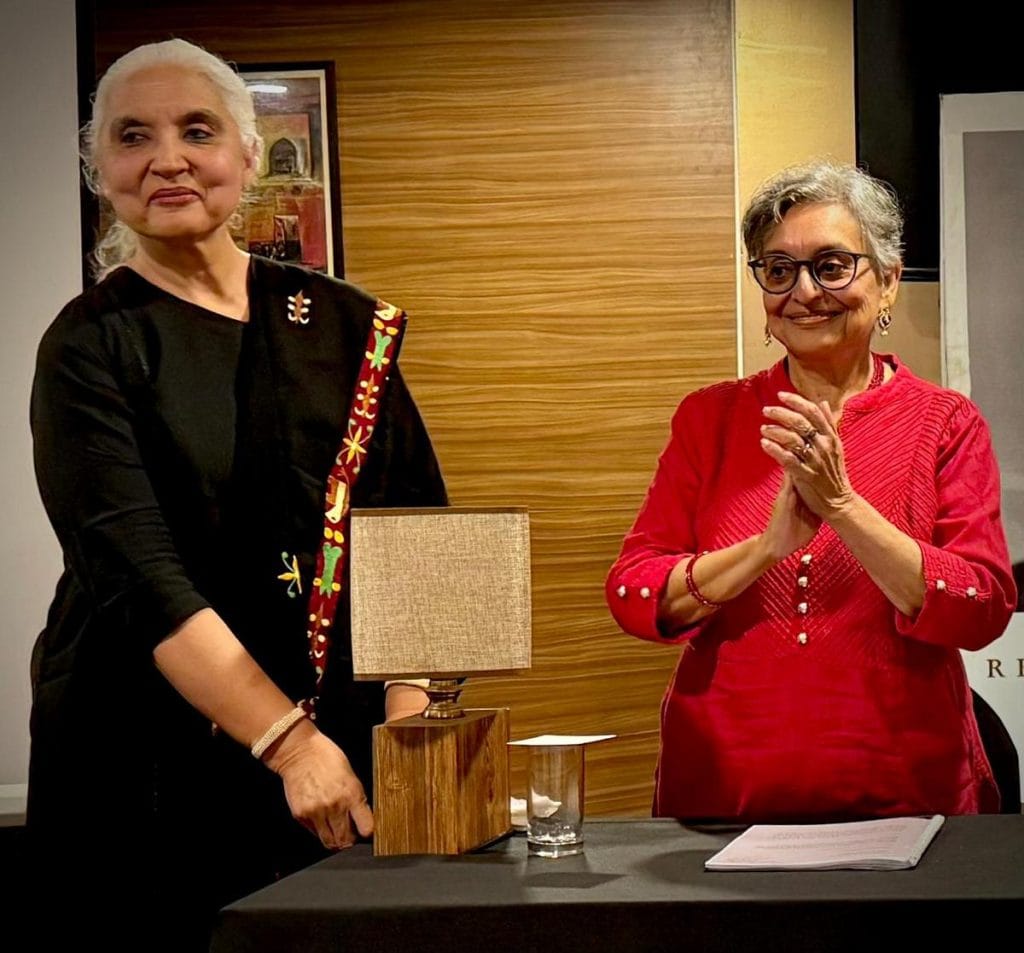
But there’s a principle behind the ‘madness’. They’ve made a conscious choice to keep their doors open and ticket-free as often as they can.
“Theatre should be for everyone, not just for those who can afford it. Our audiences respond to that honesty. They feel seen. They feel part of something meaningful, and word spreads,” said organiser Anuradha Dar. “There’s no secret patron funding us quietly. What you’re seeing is the result of a deep-rooted passion, community trust, and an unshakeable commitment to theatre as a shared, lived experience.”
There’s also the discomfort with who they are. In Delhi’s theatre scene, doing English plays as women over 50 is practically an act of rebellion.
“Three things—being a female, being older, and also doing English plays. No one tolerates that,” said Kapur wryly.
Even so, despite the biases and lack of glossy branding, there’s usually no space left to sit.
The group is now diving into its first Broadway-licensed production: Doubt: A Parable by Pulitzer and Tony Award-winning playwright John Patrick Shanley.
Humanising mothers, heroes, legends
The room dimly lit by the last rays of daylight, sweat beads on Sohaila Kapur’s brow as she delivers lines about Durga Khote from the script of Mere Paas Maa Hai, a dramatic reading. Typecast as a long-suffering mother, Khote’s own life was far more radical. She entered films when it was taboo—especially for widowed, middle-class women—and later broke away from the contract-bound studio system.
“She became one of the first freelance artists of that era, by working with other studios too. In 1936, she played Saudamini, a central character who rebels against patriarchal norms and societal injustice in Amar Jyoti, which is one of her most memorable roles,” read Kapur in the lived-in rehearsal space with a mannequin slouched on an old sofa, faded wall sconces, a green cloth draped across one wall, and mismatched chairs waiting to be props.
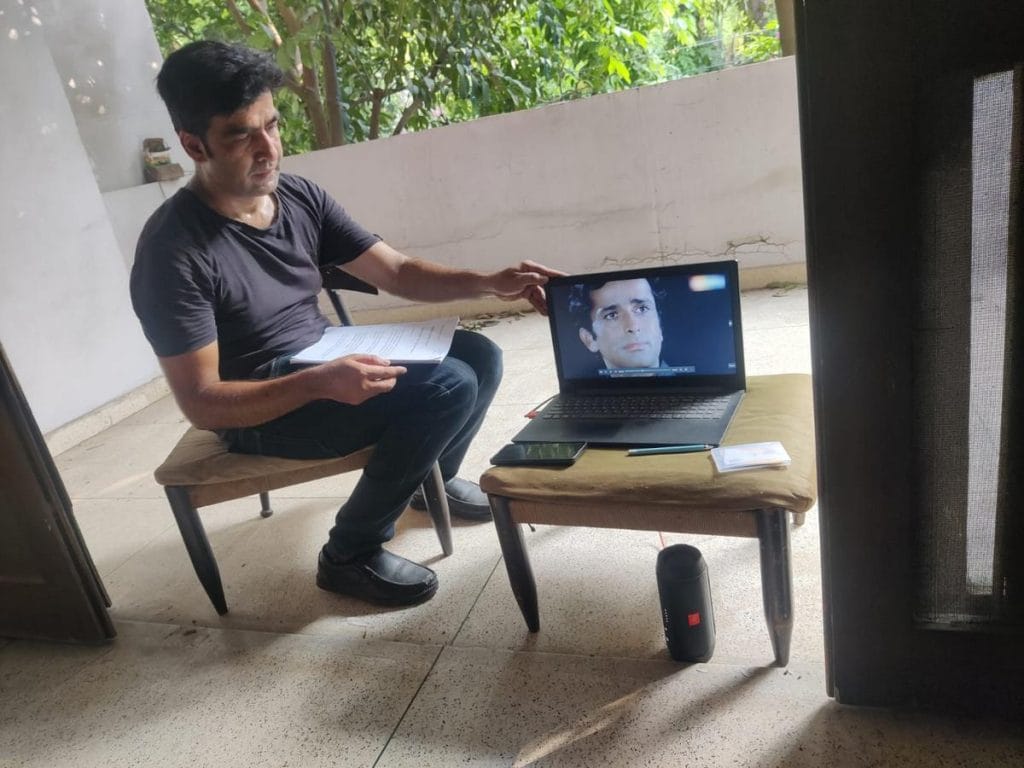
Five others sit around her, scripts in hand, occasionally referring to vintage clips of the mothers. As they take their turns, Kapur gently corrects a misstep here, offers a prompt there.
A former Times of India journalist and TV anchor, Kapur always had one foot on the stage. Before she left the newsroom in the 1980s to pursue theatre full-time, she was active with the Indian People’s Theatre Association (IPTA). She shared the stage with actors like Shabana Azmi, Anupam Kher, Satish Kaushik, Neena Gupta, and Tom Alter, and worked under renowned directors such as MS Sathyu, Nadira Zaheer Babbar, and Veenapani Chawla.
Acting, after all, is in her blood, as the niece of Chetan Anand, Dev Anand, and Vijay Anand. Her play Anand hi Anand draws deeply from that legacy.
Sohaila has started a new genre–bringing historical perspective to popular cinema through theatre… And the surprising part is young people are coming to see it
-MK Raina
“There are so many books on Dev,” she said, “but hardly anything that captures their journey together—their brotherhood, their creative fire, how they lifted each other up.”
Determined to change that, she wrote the script herself. The play has been performed in both English and Hindi—the latter transcreated by Nidhikant Panday, who has been with the group since 2010.
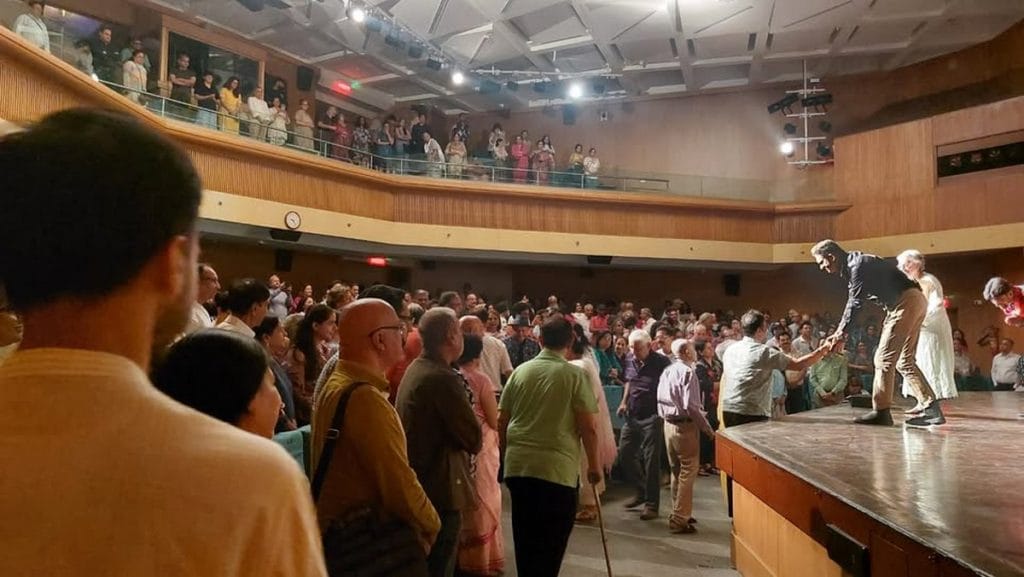
“Sohaila has started a new genre–bringing historical perspective to popular cinema through theatre,” said Raina. Her work on Chetan and Dev Anand turns their legacy into a live experience for audiences who’ve never known them. And the surprising part is young people are coming to see it.”
Last September, the group presented a dramatised reading based on Balraj Sahni’s 1972 autobiography. Titled Flashback: The Story of Balraj Sahni, it offered a complex, often painful look at the man behind the dignified screen persona he had in films like Do Bigha Zamin, Garam Hawa, and Aye Meri Zohra Jabeen. His memoir tells another story: of stage fright, crippling self-doubt, and coming home in tears, convinced he’d never act again.
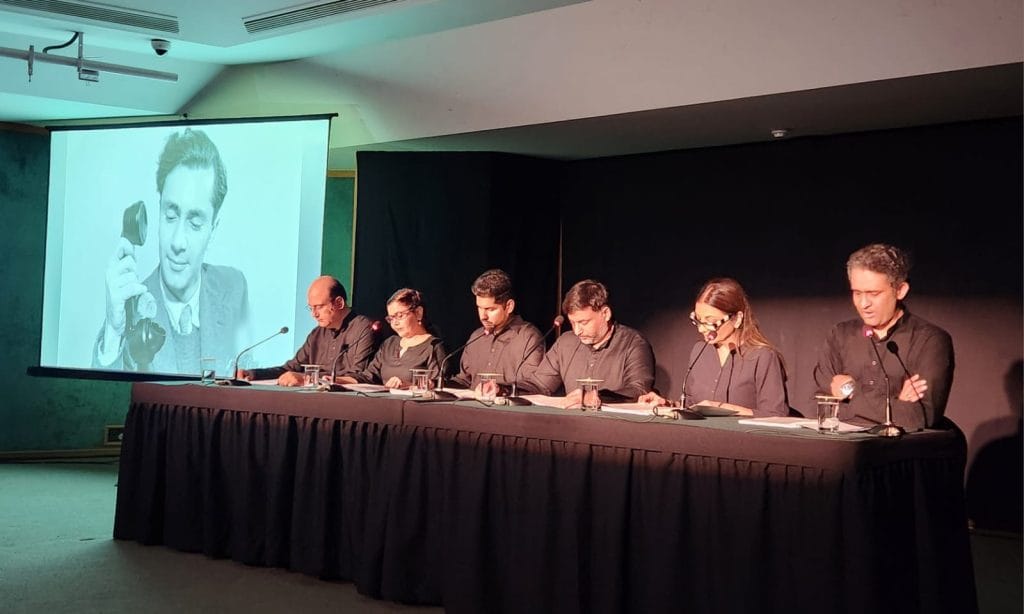
But Kapur is also a connoisseur of the stories hidden in everyday life.
“All my experiences from journalism have shaped my writing. I’ve written a few plays—not grand adventures, but stories about ordinary families,” she recalled.
One of her plays, Kuch Life Jaisa, begins at a funeral. An elderly widow has died, and her grown children return home, distracted and detached. Then a man walks in. He glances around and says, “Your mother used to keep coffee here,” before disappearing into the kitchen like he belongs.
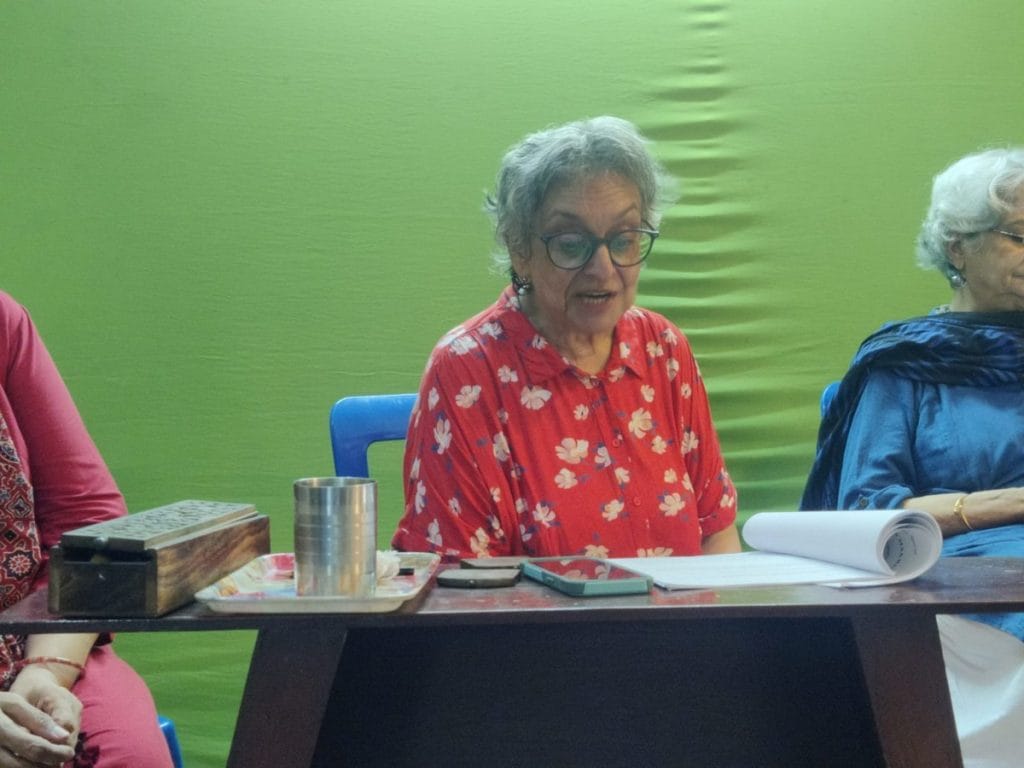
Her children are shaken by the realisation that she had a life of her own—intimate, secret, and unknown to them. The play builds on this tension, forcing them to confront how we box our parents into roles of sacrifice, and how unsettling it is to imagine them seeking love or joy beyond us.
At the Mere Paas Maa Hai rehearsal, organiser Dar listens intently, absorbing every word. Though she keeps a low profile, everyone associated with the group calls her its anchor.
“She works so much, day and night, with such passion. That’s what really drew me to Three Arts Club,” Panday said. “She just sits quietly, watching rehearsals, being fully present. She never says she wants to act or take the spotlight. But if there’s an idea, she’s always ready to bring it to life. That’s what truly matters to her.”
As the daughter of RM Kaul, one of the Three Arts Club’s original founders, she grew up surrounded by theatre and distributing brochures of plays. But then she gravitated to teaching English and ran her own school in Delhi’s Mayur Vihar until the opportunity to revive the group came in 2008.
Also Read: Akshara Theatre is a Delhi gem, and a lifeline for small artists
A third act
Not even Dar is quite sure how Three Arts Club got its name.
“We presume that it was because of the three people who started it. Or was it because of three arts that they wanted to do—dance, music, theatre? There is no clear answer,” said Dar, shrugging.
Currently, the group is in its third life. It began in 1943, in Shimla, when Om Sharma, RM Kaul, and Devi Chand Kayasth came together to create a space for theatre, music, and dance. From the start, it welcomed women on stage, which was rare at the time.
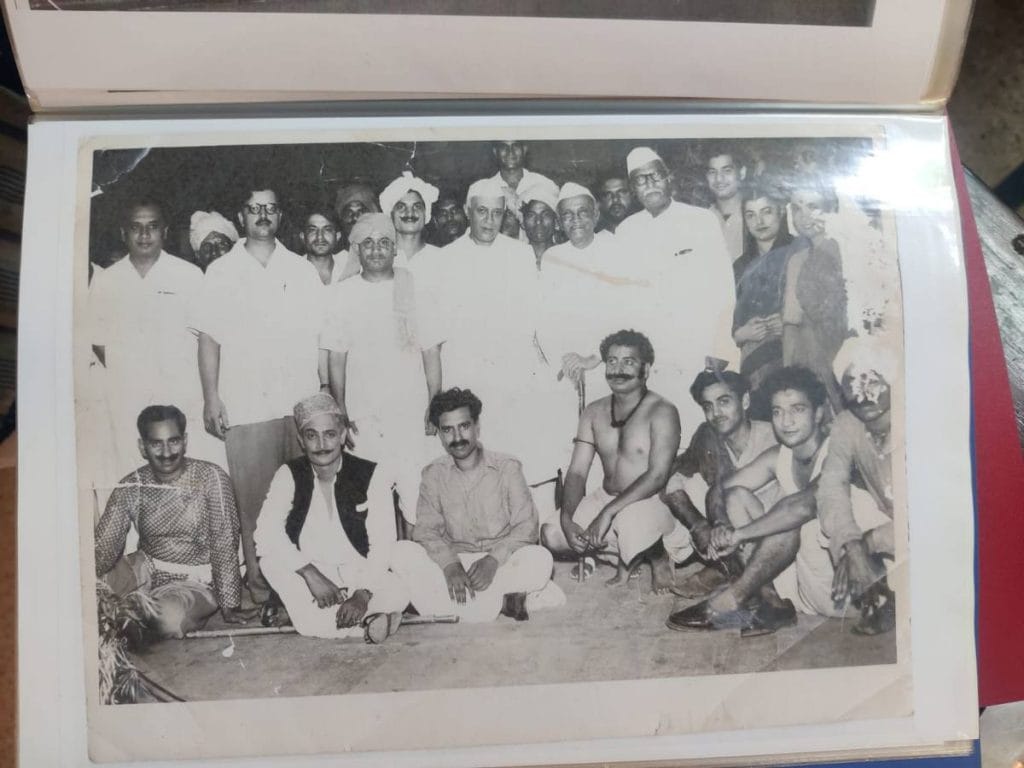
The baton then passed to another trio: Ramesh Mehta, the actor, writer, and director who shaped much of its voice, MN Kapur, the organiser (Sohaila Kapur’s uncle and Anuradha Kapur’s father), and Uma Sahay, a schoolteacher who became one of its most memorable performers. Their plays travelled widely, and were even staged for army officers and jawans in Kashmir.
Then, in 1983, Kaul died and Mehta stepped away soon after. Whatever funds remained in the club’s account were donated to the Prime Minister’s Relief Fund.
But Dar held onto the idea of revival for years.
“In my mind, I kept thinking—these people gave forty years of their lives to the Three Arts Club. Back then, they’d sell tickets by hand, and still manage to pack the theatres,” she said.
The opportunity came in 2008. Ramesh Mehta was honoured for his acting with the Sangeet Natak Akademi Award, and it was also the 25th death anniversary of RM Kaul. Dar reached out to Sohaila Kapur and Anuradha Kapur. With their shared histories and memories, the trio set about breathing new life into the group. Since then, they’ve collaborated on numerous productions.
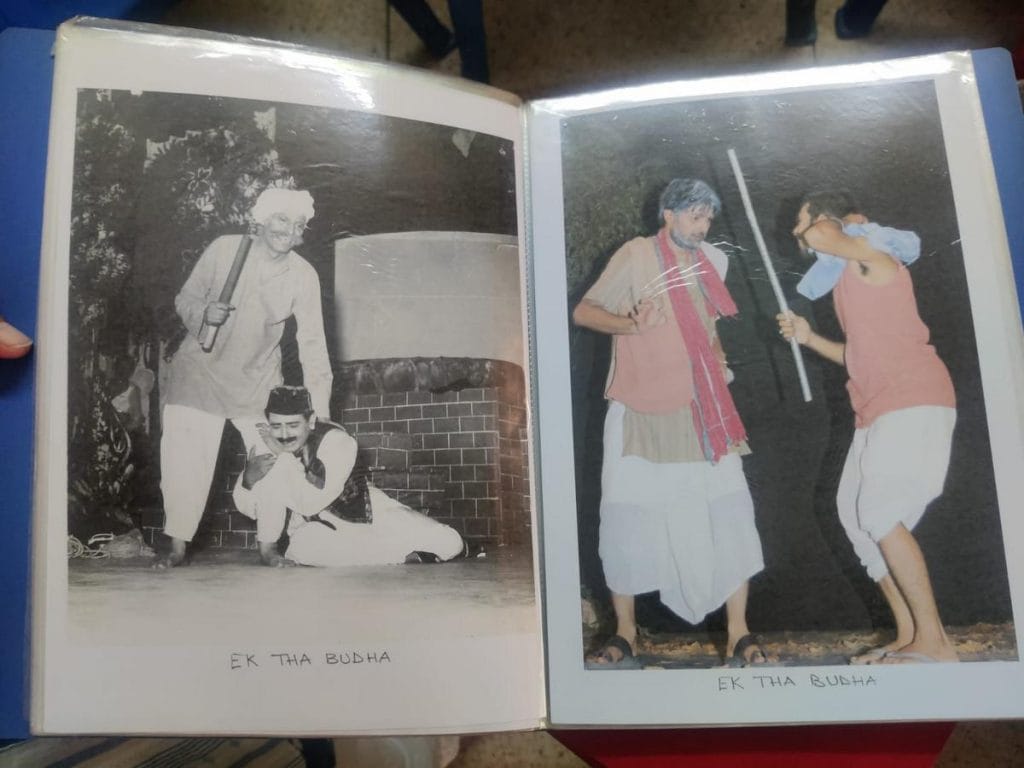
“Over time, drama took centre stage at Three Arts Club. But today, with Sohaila’s work, I think it’s finally complete. She’s brought together drama, music, dance, and art. Now, the name Three Arts Club truly fits the work,” said Dar.
They had Mehta’s blessings from the outset. After the group became active again, he once walked into a rehearsal at their space in Mayur Vihar. He was frail and leaning on a stick, but as soon as he spoke, the effect was magnetic, recounted Shalini Singh, a Kathak dancer turned actor.
“His voice filled the room with so much power, it was as if all his wrinkles vanished,” she said.
After Mehta’s death in 2012, the women paid tribute to him by staging three of his plays—Under Secretary, Paisa Bolta Hai, and Uljhan—recalled Dar.
The group is now diving into its first Broadway-licensed production: Doubt: A Parable by Pulitzer and Tony Award-winning playwright John Patrick Shanley. Set in a Bronx Catholic school in 1964, it’s a taut psychological drama about how suspicion and moral uncertainty infiltrate everyday life.
They’ve jumped through several hoops already. After writing directly to Shanley’s agents for the rights, they got permission for just two performances. And they have to follow strict conditions: Shanley’s name must lead the title, credits must follow a precise format, and the original Broadway production must be acknowledged in full. For them, it’s a labour of love.
“Three Arts Club runs largely on heart. Many of us are volunteers—actors, directors, backstage hands—who come together because we believe in the power of storytelling. We keep costs minimal by focusing on intimate, impactful productions rather than large, commercial ventures,” said Dar. “And because we’ve built strong, lasting relationships over the years, people return—not just for the play, but for the connection.”
(Edited by Asavari Singh)



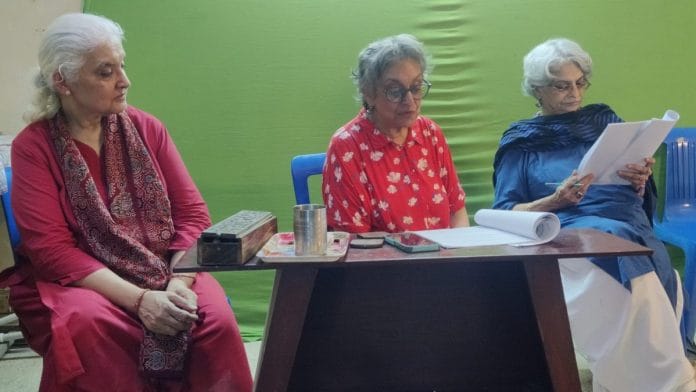



Too much repetitive video ads even after closing it every single time. Annoying the readers interest and just let me close the window without completing.